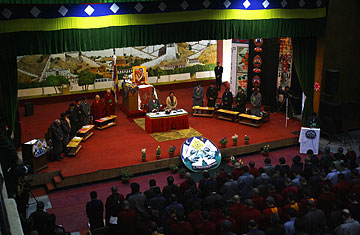
Tibetan delegates in exile attend the conference called to discuss the Tibet issue in Dharamsala, India, on Nov. 17, 2008
Discussions began Monday in Dharamsala, India, among leaders of the Tibetan exile community on the future of their decades old — and so far utterly fruitless — attempts to get Beijing to give the region some form of self-rule. The six-day talks, called by the exiled spiritual leader the Dalai Lama, who lives in Dharamsala, come at a critical juncture not only for the exiles but for their compatriots inside China and the officials in Beijing responsible for administering the region.
There have now been eight rounds of talks between the Dalai Lama's representatives and Beijing officials on what avenues might be pursued in reducing the yawning gap between the two sides. The most recent round ended in Beijing on Nov. 5 in total failure. The Tibetans said they had presented a memorandum with suggestions on how autonomy might be structured; the predictable reaction from China was one of outrage. A week after talks ended, a Chinese spokesman condemned the Dalai Lama for seeking "disguised independence," and dredged up old charges about the Tibetan leader's alleged failure to prevent exile groups from staging protests at the Beijing Olympics this summer. Beijing's later comments were even more strident, with one official alleging that the Nobel Peace Prize winner's proposal for policies favoring Tibetans was a form of ethnic cleansing. After so many unsuccessful attempts, the Dalai Lama and his advisers had to have been well aware of what the Chinese reaction would be to their proposals, especially given the fact that the 73-year-old admitted shortly before the talks started that he had already "given up" on persuading Beijing to agree to make any concessions whatsoever.
All this begs the question, then, of what the Dalai Lama hopes to achieve with this week's congress in Dharamsala, which continues until Saturday and which he won't attend until its close. Tibetologists and other analysts say there is a danger that the radical faction among the exiles, many of them younger members of the community who have criticized the Dalai Lama's self-described "third way" of trying to persuade Beijing to change its attitude on Tibet through negotiation, not independence, could rise to prominence. After all, as the Dalai Lama's representative Tenzin Taklha told reporters earlier in November, the consultative meeting would examine the exile group's approach to achieving their goal of a freer Tibet from the ground up. "Everything will be on the table," he said, except the fundamental principle of non-violence. But seeking independence more aggressively could be a risky strategy — one that might leave the Dalai Lama pitted against a section of his own people and severely weakened in the eyes of his Chinese foes.
In fact, the Dalai Lama's chief goal in holding the extraordinary meeting of exiles is the exact opposite, says Columbia professor and renowned Tibetologist Robbie Barnett. He says the summit is an attempt to "reunify all the factions in the Tibetan exile movement" at a time when it appears to be at its most fragmented. "He's been criticized strongly in the past for not allowing free discussion. This is a great way to answer that criticism," Barnett says. He thinks the likelihood of the more radical voices gaining the upper hand in the discussions is low. "They are a minority among the exile community and they are a tiny majority among ordinary Tibetans living in China, the vast majority of whom will support whatever the Dalai Lama decides." In fact, reports indicate that the process of smoothing over divisions is already beginning to happen. "The exiles at the Dharamsala meeting already received messages from inside Tibet urging them not to fight among themselves and think about the future," he says.
Having made all possible attempts to negotiate with Beijing and failed, the Dalai Lama and his supporters need an open reaffirmation of his "Middle Way" policies to keep the exile community united in and out of China. But there are also deeper, more long-term motives lying behind the decision to call this unprecedented meeting. At 73 and not in the best health, the Dalai Lama is keenly aware of his mortality. Should he die without his succession resolved, there would almost certainly be an attempt by Beijing to appoint its own Dalai Lama, just as it did nearly two decades ago in the case of the second highest ranking monk in the Tibetan hierarchy, the Panchen Lama. "He's already indicated that he's ready to consider a number of non-traditional possibilities such as appointing a child successor now or having a lay person follow him around, or even contemplating having a woman successor," says Barnett. "This seems to be turning into the forum where they can discuss issues like that."
Beijing, too, seems well aware of the Dalai Lama's age. In a recent press conference, a senior official was quoted by official media as speaking of a "post Dalai Lama era," calling on the leader to "correct his mistakes and get closer to the central government and do something beneficial for the people...during the remainder of his life, no matter if his health condition is good or poor." That would be consistent with the simple policy many analysts believe the Chinese have settled on: waiting until the Dalai Lama dies and refusing to concede anything in the meantime. Still, as strong a hand as Beijing seems to have, that approach could backfire. "They are very confident now," Barnett says "and feel that they have the upper hand. But it's consistent with their behavior in the past that they may well overplay their hand and make decisions now that help the Tibetans in the future."
See pictures from the Dalai Lama's six decades leading Tibet here.
See pictures of the March 2008 riots in Tibet and China here.
